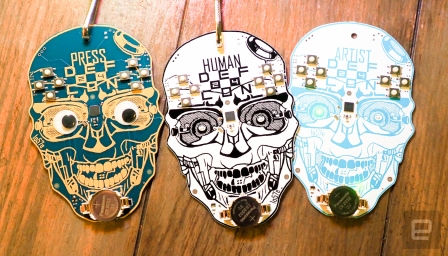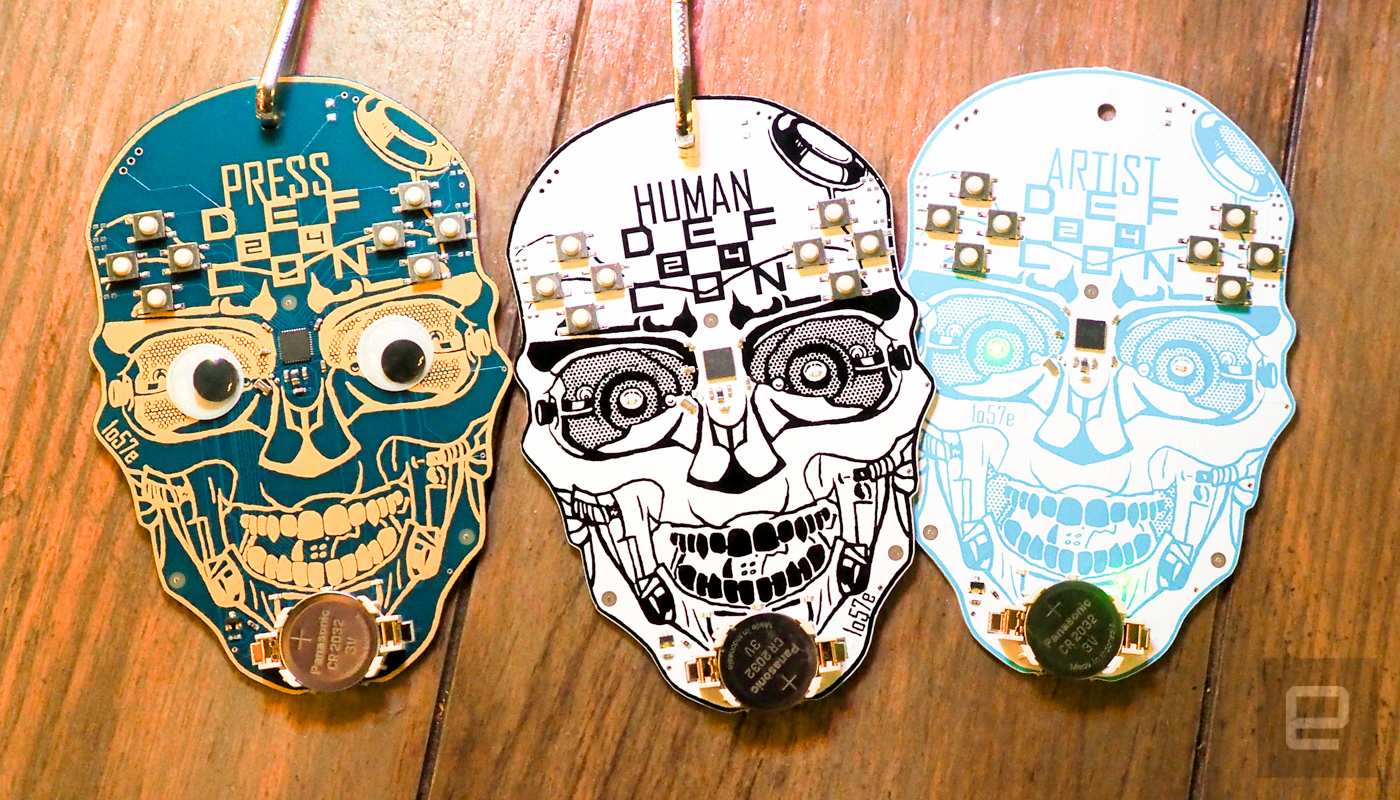The incredibly intricate badges of Def Con
Three days before the 24th annual Def Con hacker event, badge designer and builder 1o57 (aka Ryan Clarke) had a problem. “The lion’s share of the 20,000 badges showed up this year not programmed,” he told Engadget. He gathered up a team and they went into “hell mode” to hand-program blinking pieces of electronic riddled with cryptographic puzzles.
Gallery: The badges of Def Con 24 | 21 Photos
When the conference opened last week, every one of those robot skull-shaped pieces of electronics found its way onto a lanyard and around the neck of an attendee. For Clarke and other badge makers, it was the end of a long building process: time to see how their months of hard work would be received by the hacker masses. The excitement on the faces of the attendees as they start posting photos online of their newly acquired gadget is proof that this community will only continue to grow.
Because of DARPA’s AI hacking competition, Def Con’s theme this year was “Rise of the Machines.” That informed the Terminator-esque skull design, but the conference badge was more than just a bunch of blinking lights and a homage to a 1980s action film. In addition to the quickly discovered Konami/Contra cheat code that could be entered into the eight buttons above the eyes, each variation of the badge (Human, Press, security Goons, Artist, Vendors, CFP (the folks that pick the speakers), Contest and Speaker) had specific clues and cyphers printed on them.Terminator-esque skull design, but the conference badge was more than just a bunch of blinking lights and a homage to a 1980s action film. In addition to the quickly discovered Konami/Contra cheat code that could be entered into the eight buttons above the eyes, each variation of the badge (Human, Press, Security Goons, Artist, Vendors, CFP [the folks who pick the speakers], Contest and Speaker) had specific clues and cyphers printed on them.
Clues are also hidden around the conference. “I permeate all the aspects of the conference. I’m on the lanyards, in the program, on the wall signs.” Clarke said. “Anywhere creative I can think of to stick puzzles, hints, clues, games that kind of thing, I can get injected all throughout the conference.”
The prize for solving the conference badge is free attendance for life, but more importantly, the coveted Black Badge. This year’s included an articulating eye worm that popped out of a black skull that Clarke designed with Hollywood special effects artist Rick Galinson.
Clarke became the main designer/builder in 2012 after the success of his annual Mystery Challenge badge contest. When the conference founder Dark Tangent (aka Jeff Moss) recruited him, nearly every security conference was doing an electronic badge and Moss wanted something to set Def Con apart. Thus the Tick/Tock cycle was born.
One year there is an electronic badge (like this year’s); the next, there’s an analog badge. Last year the badge was a vinyl album. Previous years were playing cards on PCBs and titanium. There’s still a contest — it just involves less soldering and flashing lights. But even in non-electronic years, there’s no shortage of technology around attendees’ necks.
By the end of the conference, many attendees will have multiple badges. It’s like a sea of very nerdy Mr Ts. Nearly every subset of Def Con has its own badge: Queercon, Tiaracon, Telephreak, car hacking and others. Each one is a custom designed and typically built by a team of like-minded individuals who are happy to give up their free time to wow their peers.
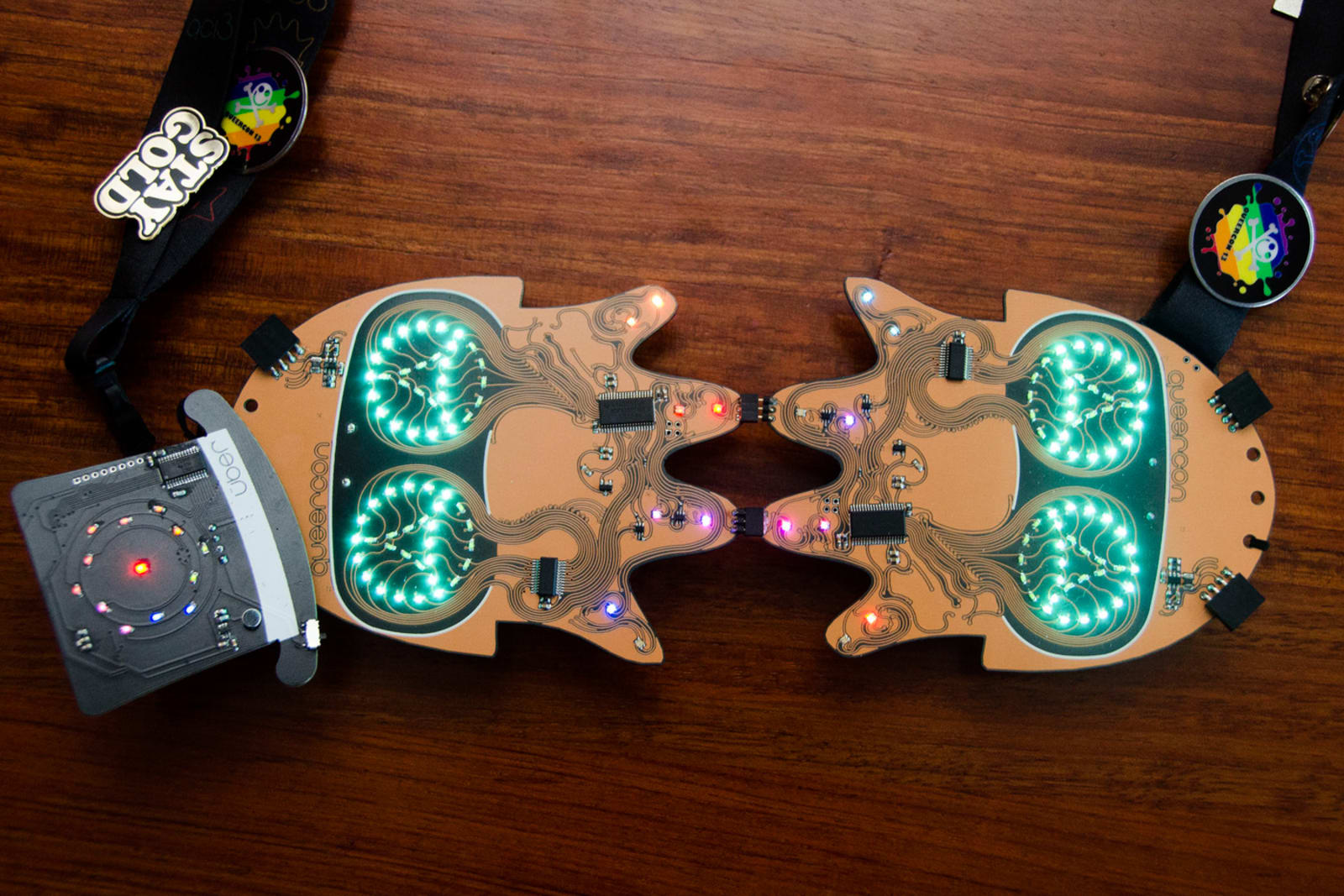
This year’s Queercon cephalopod badge was especially beautiful, with flowing trace lines and expressive eyes. These octopi could be hooked together to mate and share patterns. Plus thanks to the installed radio, nearby badges would light up when two were connected together. It created a system that forced people to interact with one another.
But for every badge that makes it, there are untold others that stalled. Evan MacKay, a hardware designer of the Queercon badge, says that some would-be badge makers don’t realize how much work and costs goes into it. “Many badge teams get caught off guard and end up failing to make it happen, or come out with partly finished badges,” he said.
Even the ones who do make are forced to make compromises. Designer 1o57 wanted the Def Con badge to be four layers thick so the only way to find some clues would be to sand off the top layer or X-ray it. “There are people every year that actually do X-ray the board, and it was going to be the year for those guys,” he said. The typhoon in Taiwan made it impossible to have ready in time.
The Queercon badge was supposed to have a thermal printer that output your stats. But it was damaged in transit and the team was unable to get it repaired in time. These setbacks are part of the process, though.
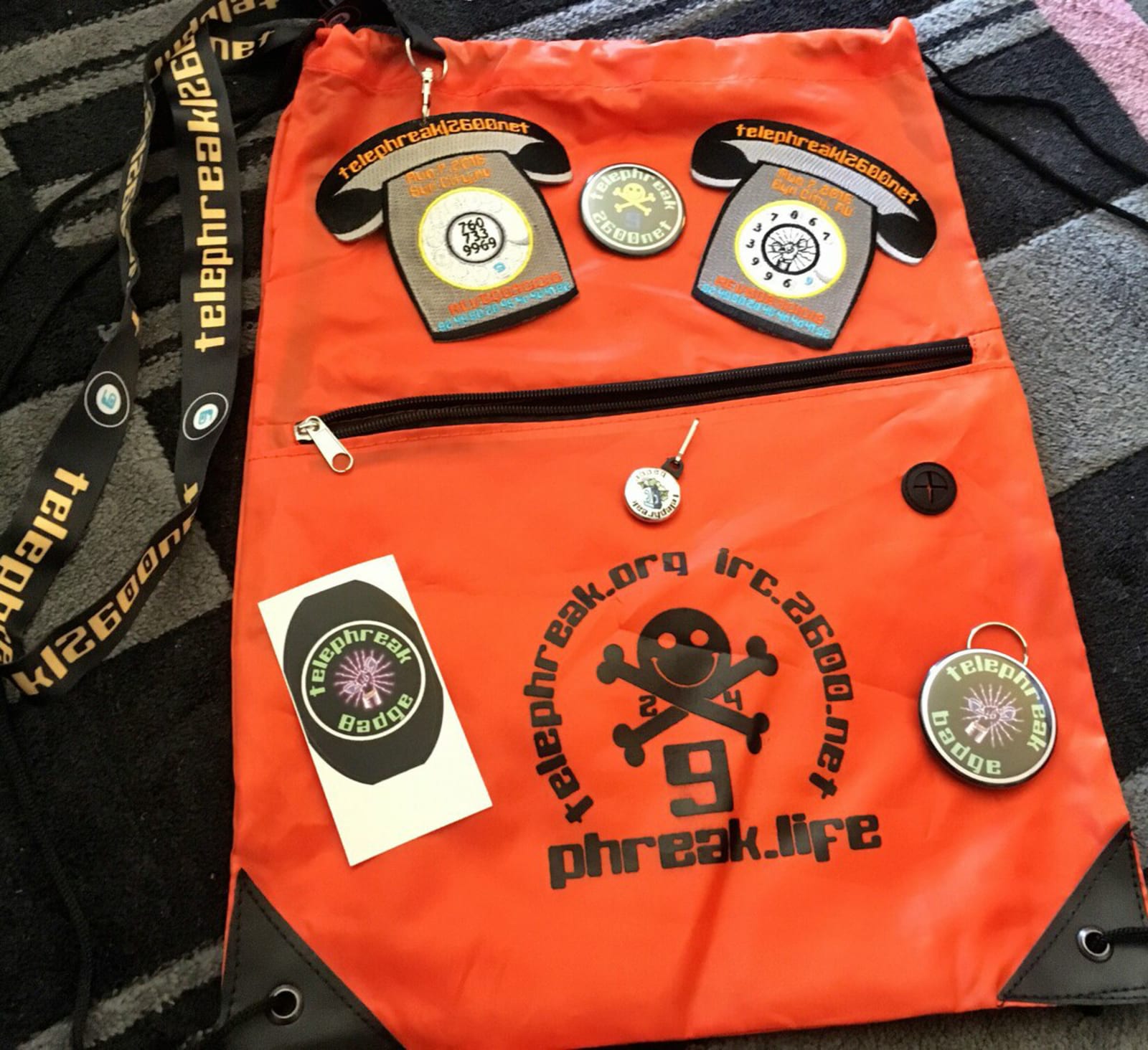
Clarke says he starts thinking about aspects of the next year’s design while still working on the current one. One of the designers of the Telephreak badge, who goes by ch0l0man, said the team started working on its analog badge during the drive home from Def Con 23. The Queercon team started working in October.
And even with all the long hours, last-minute adjustments, fear of the TSA stopping you because of all the electronics in your bag and typhoons halting production, you can expect more teams to express their technical and artistic abilities. It’s now an ingrained Def Con tradition that brings all the teams together. “Everyone is very enthusiastic and open about sharing info about the design process and their associated woes,” MacKay said.
Plus, Def Con is getting bigger. It has already outgrown the Paris and Bally’s conference spaces and is moving to Caesar’s Palace next year. “Defcon has had a growth spurt in the last couple of years so I expect to see more groups creating their own badges,” ch0l0man said.
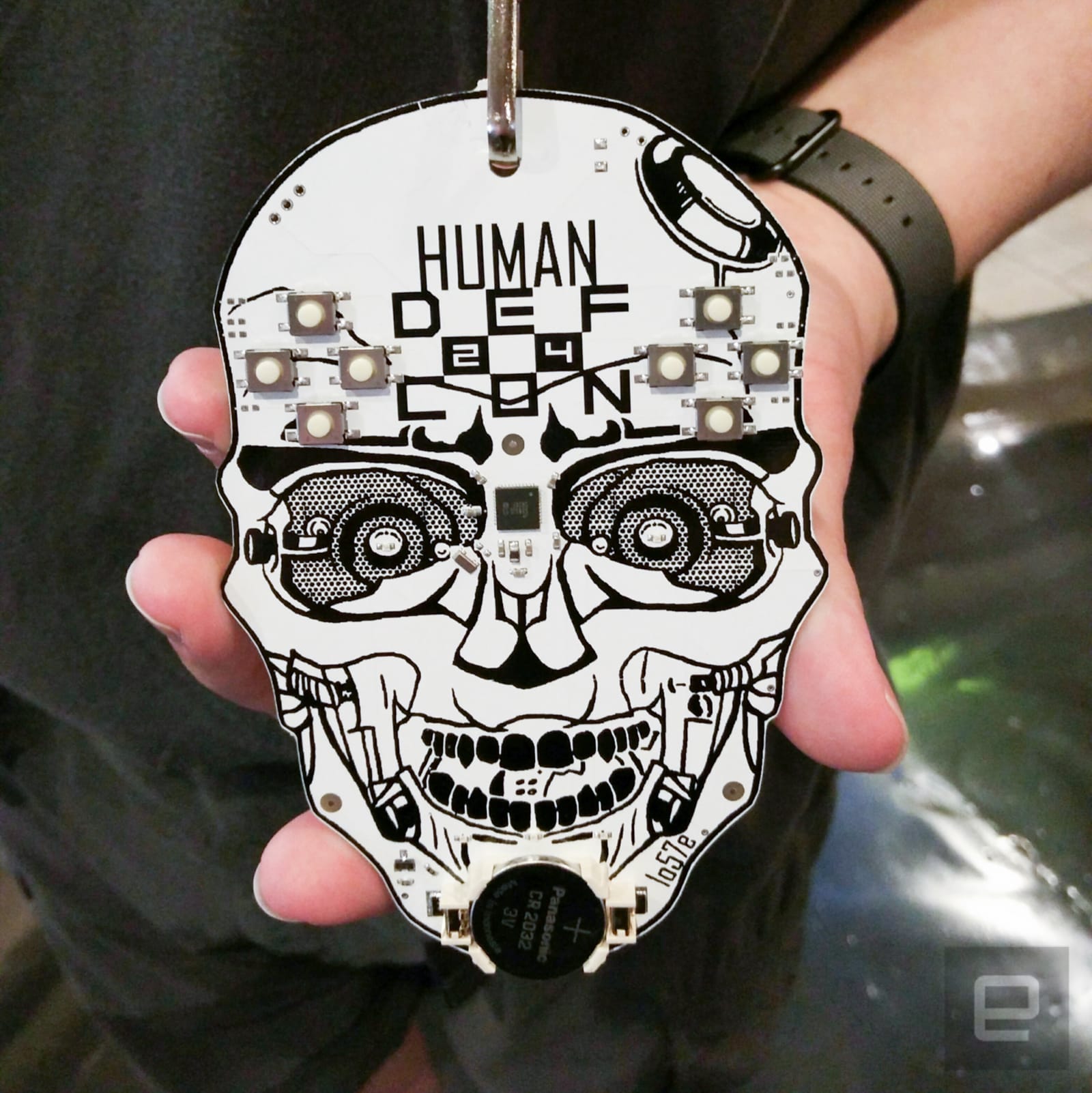
But the hacker conference isn’t just getting bigger. Twenty-five years of Def Con is a major milestone; Clarke is already musing about what next year’s badge and contest will entail. But he’s not alone. Back in their homes, researchers, hackers and artists are already sketching out their ideas. Maybe it’ll be for a large group of hackers, maybe it’ll be five or six handmade pieces of electronics for their crew. Either way, as the hacking event grows, so does its badge culture.
(143)

